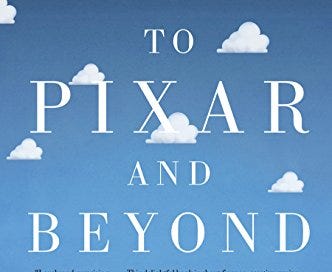
Pixar, as a studio, should not exist.
That’s not me being a cynical pessimist: Pixar had a rocky beginning and everything leading up to Lawrence Levy’s recruitment should have sunk this little silicon valley company to a watery grave.
And yet it persisted, against all odds, against the numbers, and against every Hollywood bank turning up their noses at this little company that could.
It was a fledgling studio backed by a very wealthy, a very powerful, yet very temperamental man. It had no roots in the entertainment industry and it truly was a studio subsisting on dreams and creativity.
Sold by Lucasfilm to the enigmatic and down-on-his-luck Apple founder Steve Jobs back in the ‘80s, Pixar was not built nor was it maintained as any sort of an animation studio, especially not one as the studio giant we see today. What happened was a miracle. In his book “To Pixar and Beyond,” Lawrence Levy (tech lawyer turned entertainment lawyer and Chief financial advisor turned friend to Jobs) said that in order for Pixar to succeed when it was still a fledgling studio, they needed an act of god.
They needed the kindly lightning from above to strike twice. In the same exact spot. Without any fallout.
And it did.
Multiple times over and with enough charge to bolster Pixar’s IPO and beam it to Oscar awards and multiple Disney distribution deals and a company name that shines so bright, starry eyed animators strive to reach its burning glow.
And it’s so easy to look at their success and its trademark films full of emotional depth and magnitude and imagine that from the get, this was a studio awash in the blessing of the gods.
It was not.
It was, however, a breeding ground of creativity and intelligence. The creativity that was unleashed and harnessed, the pure artistry that Pixar recruited was beyond anything Levy had ever experienced. What they needed was guidance and financial know-how and connections, which he was able to provide and muster up in his time working for the company.
Back when their studio was a squat, one-story building just north of San Francisco, their biggest selling point the distillery across the street, they were just a rough and tumble group of creatives with a burning desire to tell stories, just like you and me. And Lawrence Levy was the stirring spoon that got the pot bubbling, making sure its creatives were well taken care of and providing the studio the business knowledge it was deeply lacking.
Pixar should have failed. But through effort and conviction and story, it stayed alive.
I highly recommend this book. For lovers of Pixar, for people wanting to know more about the business of running a studio, for Steve Jobs fanboys.
But beyond the superficiality of my last statement— this is a really good book. It is well-written and highlights a time period of Pixar that is not often talked about: their beginnings and their failures.
It’s nice to see that giants began small too.
But Levy, for all his business and lawyer jargon, learned a thing or two when he was working at Pixar. He learned how to craft story.
We all know Pixar as the pillar of animation that it is today, so entering this story we could only assume the fantastic path of success after success that is a hallmark of the studio.
But this story begins right at the end, of the near defunct Pixar struggling to pay bills and convince investors that this was a company worth fighting for.
The Pixar employees charmed Levy with a rough cut of “Toy Story.” And Levy in turn used that charm to collect more and more people to invest in Pixar’s vision for animation and in Pixar’s underdog story of hope and persistence.
We know it works out in the end. But the number of hurdles they had to climb over and every stalled moment are things that would fold a company today. Be it luck or stubbornness or an absolute belief in their studio, Pixar comes out on top and the journey isn’t less harrowing because we know how it ends.
Like a blubbering baby, this book did make me cry. There wasn’t the usual drama or miscommunication or rampant deaths of beloved characters that got me bawling, it was the love.
Ew. Gross, right?
I love Pixar, but knowing how this little studio stuck to its guns and believed in itself, believed in their story so much so that it has risen to Hollywood’s star-studded streets, made me cry.
By all accounts, this should not have been successful.
But hearing about their dedication, their love, seeing their successes, accepting their failures, and then picking themselves back up to have another go is beyond inspirational.
There were a million people telling them no when all they needed was one yes.
There were a thousand things going wrong when they needed everything to go right.
They needed to convince a world that theirs was a story worth listening to when they hadn’t even made a movie yet.
For any creative out there struggling with their self-confidence and this devastating feeling that their art is not enough, trust me, it is. That’s what I learned from this book.
But I also learned that believing in yourself is the most important thing you can ever do for yourself.
To badly misquote what I consider their magnum opus:
“Anyone can [create].”





